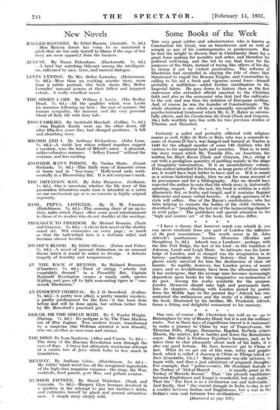Some Books of the Week
Tan very great soldier and administrator, who is known as Constantine the Great, was as- treacherous and as void of scruple as any of his contemporaries or predecessors. But he had the insight to discern that in Christianity there lay a great force making for morality and order, and therefore for political well-being, and the wit to use that force for the purposes of the State, instead of trying like others of his day to stamp it out by violent persecution. The reforms of Diocletian had succeeded in staying the tide of chaos that threatened to engulf the Roman Empire, and Constantine by calling to his aid a- fresh and vigorous moral force-himself probably a .nullifidian-added further stabilization to the Imperial fabric. He goes down to history then as the first statesman who extended official sanction to the Christian faith and also as the economist who first tied the cultivator to the soil, and was thus the initiator of European serfdom. And, of course, he was the founder of Constantinople. The whole situation is one which is eminently susceptible of the psycho-historical treatment which Mr. G. P. Baker so success- fully affects, and his Constantine the Great (Nash and Grayson, 18s.) falls worthily into line with his two previous studies of Tiberius and Hannibal.















































 Previous page
Previous page